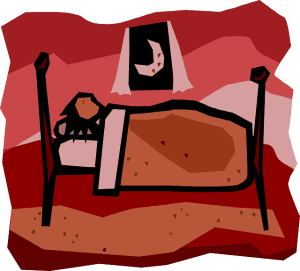Children and Nightmares… Is a Bad Dream Bad? – Guest Post by Dr. Jose Colon

When my son was 4 years of age, he once came down crying while I was working in my home office at dawn—I love the transition time between the darkness of night and royal blue of the morning.
My son was bawling, “Daddy! You were a zombie in my dream!” What is a nightmare? What is a dream?
REM (Rapid Eye Movement) sleep is our dream sleep. It is called REM because indeed there are bursts of fast eye activity. REM is commonly mistaken as “deep” sleep, but REM sleep is actually a very active sleep—the brain wave rhythm of REM is similar in rate to the awake state. We are consolidating memories in REM, turning recent events into long-term memories. That’s why we may have a dream of someone we have not seen in 10 years. My son was having a dream of myself in a Halloween mask. About a week prior we had bought Halloween costumes. And a few days prior when the cousins were in town we greeted Mama with the “Zombie” mask when she came in the door (different story for a different day). So essentially my son was just processing short-term memories into long-term storage into the hippocampus (memory part of your brain).
If it’s a simple memory consolidation, why was he so scared? The areas of your brainstem that control REM also have neuronal connections to our limbic system (our emotional area). So in REM the memory consolidation process that occurs in dreaming is also being associated with emotions. This is why we may wake from a dream with a smile and try to get back to it, or why we wake up in fret and say to ourselves that we are glad it was just a dream. Side Note: This is also why emotions elicit cataplexy!
What do you do when a child has a nightmare? Another common question I receive. First, let me say that every child and family is different. But immediately when it occurred with my son I thought of three immediate options.
1. Say it was just a dream?
2. Say a chant to make zombies go away?
3. Soothe first!
To tell him it was just a dream is clearly the most logical thing to do. Problem is kids are more Right brain predominant, that is imaginative and emotional. Logic and language are Left brain functions. Have you ever told a child it was just a dream? If so, did they shrug their shoulders, say “my bad”, and then go back to sleep with a smile? I think not. A logical approach won’t connect with such heightened imagination and emotions.
I could have said a magic chant that would dispel all zombies, however this was real to him. And to go through a process to dispel the zombie would make it more real to him, but would also make it so he needed this every bad dream—that would wake up the rest of the family with every “bad” dream thereafter.

A few months later, once again I was in my home office reading as the blue dawn was rising. I heard tears, crying, and footsteps down the stairs. My son said he had a dream that he was in a shopping cart with Chewbacca’s sister and the cart kept going even though I couldn’t get in. We had recently watched one of the newer Star Wars where they were in the land of the Wookiees, and indeed earlier that day we were at the grocery store (which at the time my 4 year old son and 2 year old daughter both affectionately associate with cookies while in the shopping cart). Once again, memory consolidation.
I gave him a hug. In the office there was a fake finger on the floor (Halloween 24/7/365 in our house). I put the fake finger on him and asked if this is his real finger. “No,” he replied. I then took the finger off and asked did if his finger really come off. “No,” he replied. Then I explained that he wasn’t really riding with Chewbacca’s sister and that he is safe. Safe, I repeated many times. Couple more hugs and he went back to bed. If he later has a dream that Chewbacca ate his finger, then that lesson would have backfired on me.
All kids dream, it is normal for them to be able to make memories. Some dreams have scary emotions, it is normal for them to process emotions. Hence is a bad dream “bad”? Give your kid a hug and do what you do best, love them.
Sleep paralysis and lucid dreaming are different subjects for a different day! And if the dream is associated with a traumatic event then the nightmare disorder is actually a sign of another disorder such as PTSD.





